9 outstanding international events last week
(Baonghean.vn) - South Korean President Park Guen-hye was impeached; Many US states protested the new entry ban; Wikileaks published documents about the CIA's secret infiltration tools; The US THAAD missile system arrived in South Korea;... are notable international events last week.
1. South Korean President Park Guen-hye was impeached
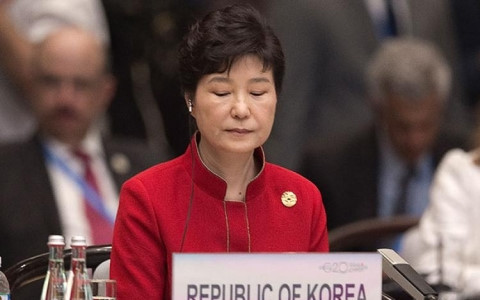 |
| South Korean President Park Geun-hye has just been impeached. Photo: Yonhap |
On the morning of March 10, a judge of the Constitutional Court of South Korea announced that he would uphold the decision to impeach President Park Geun-hye that the country's National Assembly had previously made.
With this ruling of the Constitutional Court, Ms. Park Geun-hye will be forced to leave office before the end of her term.
Thus, Ms. Park Geun-hye has become the first democratically elected President in South Korea to be forced to leave office. According to the South Korean Constitution, within 60 days of this ruling, South Korea will hold a new presidential election.
After this decision of the Constitutional Court, Ms. Park will be forced to leave the Blue House and will no longer enjoy immunity from prosecution.
2. Many US states oppose the new entry ban
 |
| People protest against the US government's new immigration ban in New York on March 9. |
On March 9, a day after the state of Hawaii sued US President Donald Trump's new immigration restriction order, Washington state and several other states announced they would take legal action to block the document.
Speaking to the press, Washington State Attorney General Bob Ferguson said that at least three states, Minnesota, New York and Oregon, have announced they will join this new legal battle.
Mr. Ferguson asked the court to continue applying the suspension order currently in effect on President Trump's first travel ban to the new order announced by the administration on March 6.
3. Germany: Axe attack at train station, 6 people injured
| Scene of the incident. (Source: BILD) |
On March 8, an axe-wielding man attacked people at the main train station in Dusseldorf, western Germany, injuring six people.
According to police at the scene, two suspects in the attack were arrested and one of the victims was seriously injured.
German newspaper Bild quoted a witness as saying that a suspect jumped out of the crowd and swung an axe at people, then tried to run into the street but was arrested by police. The other suspect was also arrested at the train station.
German Federal Police described it as a "frenzied attack". The train station was closed while police carried out an operation.
4. Wikileaks publishes documents about CIA's secret hacking tools
| Wikileaks publishes documents related to CIA's hacking tools into electronic devices. Photo: Cnet |
Wikileaks has published the largest ever set of documents on software tools and techniques used by the CIA to hack into almost all electronic devices such as smartphones, computers, and internet-connected TVs.
According to Wikileaks, the tool called “Weeping Angel” is a product developed by the CIA in cooperation with the British intelligence agency MI5, capable of penetrating Samsung smart TVs and controlling them even when the device is turned off.
Wikileaks also revealed that the CIA has built other hacking tools that can remotely control iPhone, iPad and Android devices - secretly taking video footage from the device, eavesdropping on conversations through the device's microphone and tracking the user's location.
5. US deploys THAAD missile defense system to South Korea
| A test of the US military's THAAD missile defense system. (Photo: Reuters) |
According to a source from the US military, the first part of the US-developed Terminal High Altitude Area Defense (THAAD) missile system was transferred to Osan Air Base in South Korea on the night of March 6 (local time). This statement was made less than a day after North Korea launched four ballistic missiles into the sea.
In the face of North Korea's increasing number of missile and nuclear tests since 2016, the US and South Korea have always emphasized the importance of speeding up the development of the THAAD missile defense system.
Experts say THAAD is designed to shoot down missile targets that could threaten residential areas, similar to the mechanism of using one bullet to shoot another bullet.
“North Korea’s continued provocations, including its missile launches on March 6, further demonstrate that the alliance’s decision to deploy THAAD to South Korea was prudent,” said Harry Harris, commander of the US Pacific Command.
6. North Korea launched 4 ballistic missiles towards Japan
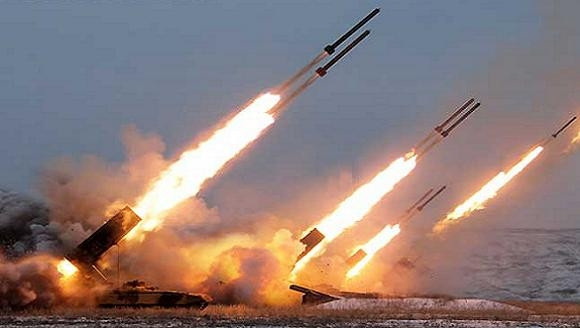 |
| In retaliation for the US-South Korea joint military exercise, North Korea launched four missiles. Illustration photo: Yonhap. |
On the morning of March 6, Japanese Prime Minister Shinzo Abe said that North Korea had launched four ballistic missiles into the sea, three of which flew about 1,000 km and landed in Japan's exclusive economic zone.
According to South Korean military sources, the missiles were fired from Tongchang-ri, near the northern border between China and North Korea at 7:36 a.m. (local time). It is not yet clear what type of missiles were launched.
This ballistic missile launch is the latest missile test conducted by Pyongyang. According to military experts, after a series of consecutive missile launches, North Korea's missile technology has significantly improved.
Last month, North Korea said it had successfully tested a new type of ballistic missile in a launch supervised by leader Kim Jong-un, the first such launch since Donald Trump took office as US president.
At the time, the US, South Korea and Japan strongly condemned the move, calling it a violation of UN Security Council resolutions.
7. Putin fired 10 generals for unknown reasons
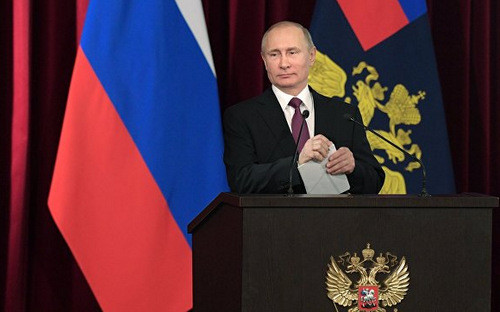 |
| Russian President Vladimir Putin speaks earlier this year. Photo: Ria Novosti. |
Russian President Vladimir Putin has issued a decree dismissing generals from the Ministry of Internal Affairs, the Federal Investigation Committee and the Federal Penitentiary Service.
The list of dismissals includes people with important positions such as Major General Alexander Gnezdilov, head of the Federal Penitentiary Service (FSIN) of Saratov region, Major General Sergei Zhevlakovich, Vice Rector of the Moscow State University of Internal Affairs, Major General Alexander Novikov, Head of the Department of Educational, Social and Psychological Work of the Federal Penitentiary Service, Major General Alexander Filin, senior investigator of especially serious cases under the direction of the Chairman of the Investigative Committee, according to Ria Novosti.
President Putin also dismissed Lydia Dyakonova, prosecutor of the Jewish autonomous region, and Sergei Legostaev, prosecutor of the Chuvash Republic. The Kremlin did not give a reason for the dismissals.
8. Japan commemorates more than 18,000 people in the tsunami disaster
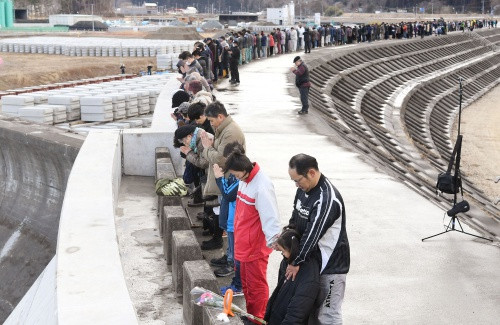 |
| People meditate on the seawall in Iwate prefecture. Photo: Reuters |
Japan observed a minute of silence on March 11, six years after the tsunami and earthquake disaster left more than 18,000 people dead or missing, and 120,000 homeless.
Prime Minister Shinzo Abe and other government officials, as well as Prince Fumihito and Princess Kiko, were among those attending the ceremony at the National Theatre in Tokyo.
In his speech, Mr. Abe pledged to continue to promote reconstruction efforts. The prince expressed regret that many people could not return to their old homes due to high radiation levels in Fukushima Prefecture.
The nuclear disaster occurred when a tsunami engulfed the Fukushima No. 1 nuclear power plant, causing the reactor core to melt, releasing radioactive substances into the environment.
More than 123,000 people remain displaced, including more than 39,500 who fled Fukushima. It is the world’s worst nuclear disaster since the 1986 Chernobyl accident in Pripyat, Ukraine, then part of the Soviet Union. It will take at least four decades to decommission the Fukushima plant, the operator said.
9. Malaysia-North Korea tensions reach a peak
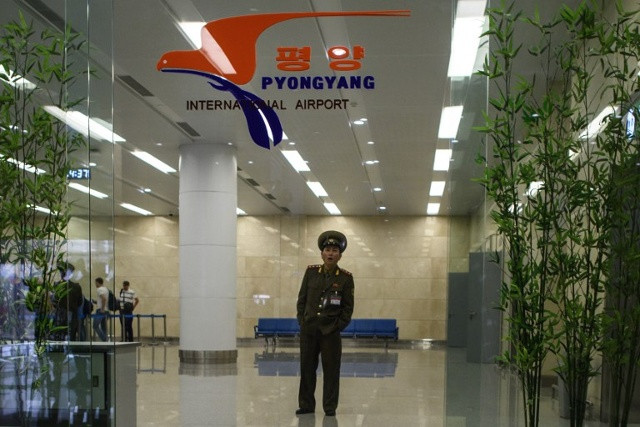 |
| Pyongyang bans Malaysian citizens from leaving North Korea. |
North Korea and Malaysia after the decision to deportambassadors of each other, and continued to ban all citizens of the other country from leaving their country.
Along with the Prime Minister's statement, the Malaysian Ministry of Foreign Affairs also quickly took action to free all citizens currently in North Korea.
On the morning of March 7, North Korean media reported that all Malaysian citizens in North Korea were banned from leaving the country. Pyongyang announced that this decision would be effective until the incident in Malaysia was resolved.
The tit-for-tat between North Korea and Malaysia comes amid growing diplomatic tensions between the two countries over the assassination of a North Korean citizen believed to be Kim Jong Nam, the estranged brother of North Korean leader Kim Jong Un, at Kuala Lumpur International Airport.
Peace
(Synthetic)
| RELATED NEWS |
|---|



.jpg)







